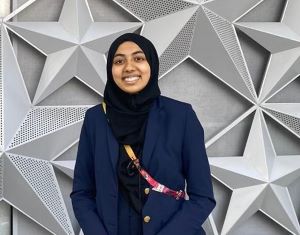Students planning careers in U.S. foreign affairs can apply for Rangel International Affairs Summer Enrichment Program

USA Pavilion at Expo 2020 Dubai
Psychology and political science major Aaminah Tabassum found herself in a spot many young students do: watching the news and feeling overwhelmed by everything happening in the world, and wondering if there was anything she could do to help.
“Watching the news so many times and feeling powerless and not being able to do anything about anything going on,” says Tabassum. “There were only so many news cycles that could go by without me feeling like I needed to be doing something.” This led her to wanting a career in foreign policy and diplomacy.
Tabassum began researching international affairs internships and found the Charles B. Rangel International Affairs Summer Enrichment Program, a six-week program for undergraduate students meant to increase career opportunities in current events and foreign affairs. Members of minority groups historically underrepresented in the Foreign Service, women and those with financial need are encouraged to apply.
After drafting multiple application essays and getting the required letters of recommendation, Tabassum applied to the program as a freshman but was not selected. She reapplied and was accepted two years later. She says expanding opportunities in international affairs for underrepresented groups is key.
“Government is made up of individual people and their decisions,” she says. “If you don’t have that seat at the table and you don’t have representation, then only a certain demographic is going to be making those decisions, shaping U.S. foreign policy. That is very detrimental in a field like foreign affairs when you need the perspective of a diverse audience, because you’re working with a diverse world. We have our foot everywhere, we make policy in a lot of places, so we need underrepresented groups to have a voice in government.”
Like most things in the past year and a half, the Rangel program was affected by COVID-19.
“Normally, it’s an on-site program in Washington, D.C., but due to COVID it was virtual,” says Tabassum. “It was still a very valuable experience. We got a lot of connections with state department and foreign service offices, and a lot of people involved in international affairs. General players you don’t always think of when you’re considering a foreign policy career.”
Most of Tabassum’s work consisted of being on Zoom engaging in classes and seminars with international affairs experts from 11 a.m. to 8 p.m. “We had seminars on diplomatic writing with a former foreign ambassador; we had a history of foreign relations and political economics class. We also met with state department officials and other foreign policy practitioners in various seminars.
“Obviously, networking is very different online. They had to deal with some fatigue due to all the online learning, but it was still valuable. Hanging out with my cohort even in just a virtual setting, talking to them about the experiences they’ve had. One of my friends worked on an Islamophobia documentary in France. It was incredible to be with people around my age doing change-making things in society, it’s so inspiring to see their stories and hear from them.”
One of the main world issues that Tabassum hopes to be able to work with someday is the Israel-Palestine conflict. During her time with Rangel she was able to meet with state department officials who were experts in this area.
“Just learning from their experiences and having those conversations was so valuable,” says Tabassum. “And I hope to be able to continue having those conversations and working on projects with them.”
While Tabassum was not able to study on-site with the Rangel, she is currently a Young Ambassador in the USA Pavilion at Expo 2020 in Dubai, a world expo bringing together representatives from 192 different countries showcasing different ideas in the expo’s themes of sustainability, mobility and opportunity.
“It was a good transition for me, as Rangel was very academic,” she says. “Whereas I’m now working with state department officials doing on the ground work. It’s very interesting.”
While being selected for a major program like Rangel may seem like a daunting task, Tabassum says it is worth applying regardless of how many candidates are selected. “You have a zero percent chance if you don’t even try,” she says. “You’ll be surprised, some of the smaller scholarships may reject you, but you may get accepted by the larger ones. It’s all about how the individuals on the selection committee view and connect with your story. It’s a marathon, I’ve lost track of how many I’ve applied to and not even heard back from, but if you just get even one it makes it all worth it. Use the resources at Wayne State, everyone was so much more supporting than I could have imagined, and I’ve received so many opportunities.”
One of the resources Tabassum used was the WSU Office of Fellowships, which helps undergraduates and recent graduates apply for national fellowships that provide valuable funding, connections and prestige. The staff helps students articulate their ambitions and create persuasive applications. As in Tabassum’s experience, just applying for the awards will challenge students to define who they want to become and how to achieve their potential.
Students interested in applying for nationally competitive fellowships can learn more online: oip.wayne.edu/fellowships.
By Jacob Stocking, OIP communications associate
The Office of International Programs leads Wayne State's global engagement by creating opportunities that foster international education and research, facilitate the exchange of individuals and ideas that promote global competencies and citizenship, and provide resources that support the expansion of the university's global agenda. Follow us on social @WayneOIP.